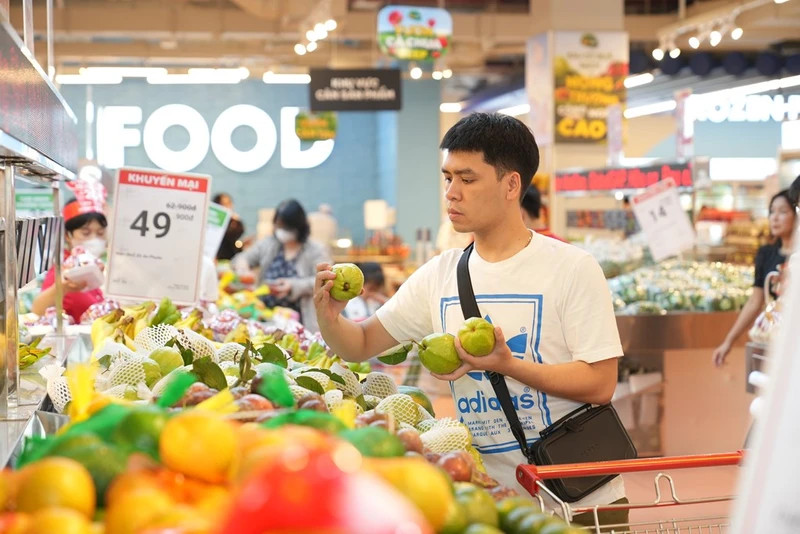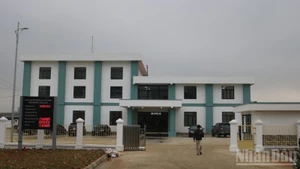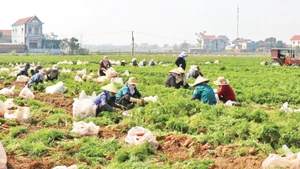As the Lunar New Year approaches, the commodity market has “heated up” every day. Due to the high demand of people, supermarkets, distributors, traditional markets, etc. have proactively imported and stockpiled essential goods such as rice, cooking oil, poultry, livestock, especially cakes, candies, jams, and soft drinks. Many units have actively implemented attractive promotional programmes, especially for goods with high demand, to stimulate purchasing power, contributing to price stabilisation and inflation control.
According to information from the Hanoi Department of Industry and Trade, large distribution enterprises in the area have proactively prepared goods two months before Tet, with domestic and imported sources. The Department has proactively developed plans to ensure the supply of goods and stabilise prices; at the same time, it will closely monitor the supply and demand of goods, and solutions to regulate goods sources will be deployed promptly.
Accordingly, groups of goods and quantities of goods that need to balance supply and demand include: rice, pork, chicken, duck, seafood, poultry eggs, processed foods, vegetables, sugar, cooking oil, spices, milk for children under 6 years old and groups of goods with high demand during the Tet holiday season such as jam, candy, wine, beer, soft drinks.
To promptly serve consumers, goods distribution activities are also organised in many forms. Specifically, through traditional sales channels (a system of 30 shopping centers, 131 supermarkets, 455 traditional markets, 2,000 convenience stores, 110 OCOP product introduction and sales points and tens of thousands of grocery stores in the area); organised on multimedia sales channels with 268 websites providing e-commerce services and online sales channels (via phone, website, shopping application...) of traditional distribution systems in the area.
In addition, the authorities have also encouraged and mobilised businesses to expand their business networks, prepare reserves of goods to provide early and adequate supply of essential goods to serve people at reasonable prices and good quality. Along with stabilizing the market at supermarkets, the units participating in the program implement the policy of bringing Vietnamese goods to rural areas and the price stabilization policy for groups of goods such as food, foodstuffs, household appliances, cosmetics, clothing, etc. to serve the shopping needs of people during the Lunar New Year.
To implement the price stabilisation policy, ensure the supply of essential goods to serve consumer needs at the end of the year and the Lunar New Year 2025, functional sectors need to strengthen inspection, examination, and supervision of compliance with legal regulations on food safety with production and business enterprises; in which, focusing on the origin, labeling of goods, and quality of goods circulating on the market.
In addition, relevant agencies need to continue to develop the price stabilisation sales network to rural areas, remote areas, and mountainous districts; encourage units participating in the program to invest in developing modern distribution models such as supermarkets and convenience stores to promote the consumption of market-stabilising goods.
It is also necessary to develop a plan to organise early mobile sales trips, bringing stabilized goods to serve people in rural areas, remote areas and mountainous areas in conjunction with propaganda and response to the implementation of the campaign “Vietnamese people prioritise using Vietnamese goods” as proposed by districts, towns and cities to serve the consumption needs of people during the traditional Tet holiday.
In addition to designating units to receive loan support to implement the market stabilisation programme, localities need to have additional mechanisms to attract businesses, distribution units, wholesalers and retailers of essential goods for Tet that meet the conditions and requirements to participate in the program; play a good role as a bridge between large production and distribution enterprises and localities to establish a sustainable production and supply chain, creating a stable source of goods for the market at reasonable prices; strengthening close monitoring of the situation and developments in domestic supply and demand of essential goods, serving consumer needs.
















